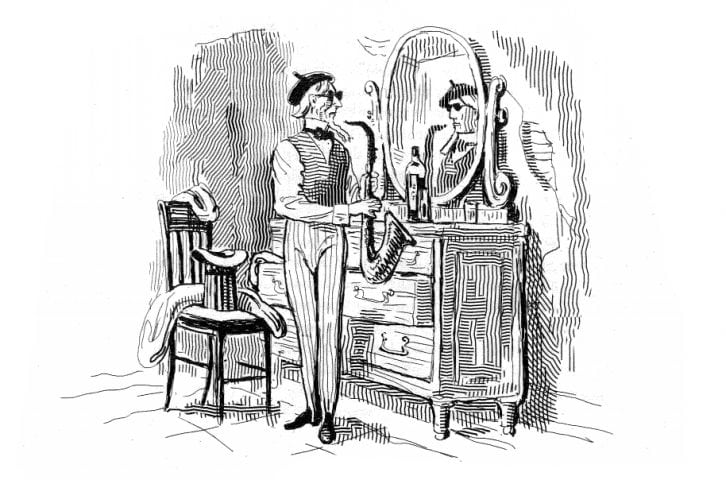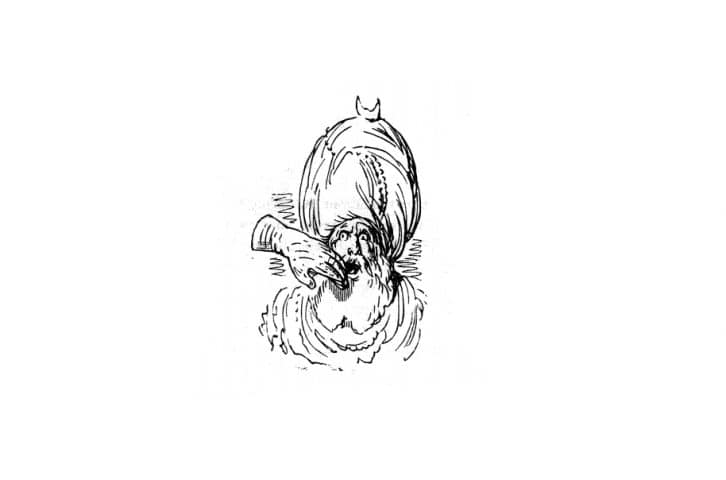Books Reviewed
A review of Existential America, by George Cotkin
Having been urged by a guest at a White House dinner in the winter of 1944 to read the Danish philosopher, Søren Kierkegaard, President Roosevelt later told his secretary of labor, "You really ought to read him. Kierkegaard gives you an idea of what it is in man that makes it possible for these Germans to be so evil." In Existential America, George Cotkin provides this anecdote by way of introduction to a discussion of the early 20th-century rise of American interest in Kierkegaard, considered one of the founders of existentialism. Cotkin's book comes up short as a work of philosophy, since it fails to clarify the meaning and scope of its central term,"existentialism," or to wrestle with the conceptual difficulties to which this approach to philosophy gives rise. But as a wide-ranging study in American intellectual history, it is quite informative. It makes a convincing case for the widespread influence of so-called existentialist authors on American thought and culture. Cotkin demonstrates the breadth and diversity of the sources of existentialist influence; he devotes nearly as much attention to Kierkegaard and Dostoevsky as to the predictable French authors, Camus and Sartre.
The "bohemian café lifestyle" associated with the French existentialists received fairly regular, and generally positive, portrayals in popular American magazines such as Time. To questions about this contradiction between the dark tenets of his philosophy and his genial lifestyle, Camus once remarked with vintage French insouciance, "Just because you have pessimistic thoughts, you don't have to act pessimistic." Americans, it seems, were able early on to take the French as lightly as they took themselves. In the film "Funny Face" (1956), Audrey Hepburn played a young woman enamored of existentialism who on a trip to France meets Professor Flaustus, clearly a stand-in for Sartre. Hepburn ends up dismayed with Flaustus whose libido is more powerful than his intellect.
Yet Cotkin's work extends beyond America's fascination with French existentialism. The indefatigable efforts of Walter Lowrie and David Swenson to see Kierkegaard's works translated into English and his ideas disseminated in American intellectual circles constitute significant contributions to American intellectual life in the 20th century. Lowrie was attracted to Kierkegaard as an alternative and corrective to the "meek posture of liberal Protestantism," to its "confusion of the here-and-now with the eternal kingdom of God." It is as a theological thinker, not as a proponent of existentialism, that Kierkegaard also saw himself. His goal was to recover the radical challenge and invitation of the Gospel, which was rapidly being assimilated and reduced to something other than Christianity—to philosophical speculation, in Hegel, and to generic liberalism in politics and the mainstream churches.
In American literary circles, Dostoevsky emerges as an important existentialist influence, especially among African-American authors, such as Richard Wright and Ralph Ellison. Wright's under-appreciated novel, The Outsider, and Ellison's famous Invivible Man both take their point of departure from the narrator of Dostoevsky's early, polemical, Notes from Underground. Here we find authors who engage the threat of nihilism, who analyze the malaise of spirit that can afflict any human being, "without celebrating it." In Dostoevsky, for example, the darkness is never complete and a "glimmer of God slashes through."
The dissemination of the writings of Kierkegaard and the dramatic recasting of themes from Kierkegaard and Dostoevsky in the fiction of Wright and Ellison mark high points in the scholarly and literary heritage of American existentialism. Other episodes in American existentialism now seem intellectually embarrassing. Despite their protestations of liberation from constraining dogmas and pretensions to embracing the abyss, existentialist thinkers, at least second-rate existential thinkers, exhibit a lingering romanticism and a reversion to dogmatism. Norman Mailer romanticized the life of the American Negro as representative of the "psychopathic hipster personality," in which Mailer detected a "joyous transcendence" of decadent, mainstream American culture. The statement earned him a well justified rebuke from the novelist James Baldwin, who countered that these personality distortions were a sign, not of joyous transcendence, but of "humiliation and suffering." Although Cotkin does not intend them to be read thus, Simone de Beauvoir's debates with Betty Friedan over women, work, and family read like a parody of feminism. Assuming that only through work can women achieve fulfillment, Friedan argues that women who stay at home should be given a minimum wage for the labors of housework. Beauvoir labels this "reactionary" and insists that no woman should be "authorized to stay home." In his presentation of this disagreement, Cotkin remains inexplicably measured and ends by lamenting the failure of each woman to "recognize the other as a fellow traveler in the existential attitude."
Cotkin does repudiate the naïvete of French accusations of American naïvete, for example, in Sartre's claim that "evil is not an American concept" or de Beauvoir's assertion that "Americans have no feeling for sin or remorse." But we do not exactly need existentialism to refute these ascriptions. As Cotkin himself notes, an appreciation of evil and a feeling for sin and remorse are not exactly absent from the sermon literature of the New England puritans, the dramas of Hawthorne and Melville, or the tragic strains of Lincoln's political rhetoric.
But this underscores a flaw in Cotkin's book. At times, he seems to want to label "existentialist" anything that deals with dark themes or wrestles with doubt and despair. The problem is that the book never really gets beyond its opening, and fairly vague, descriptions of existentialism. "To be existential is to have those dark nights of the soul when the loneliness of existence becomes transparent and the structure of our confidence lies shattered around us. To be existential is to encounter those moments when vainglorious systems of logic totter and polite evocations of Sunday preachers fail to touch the core of being…to wrestle most fully with the jagged awareness of one's own finitude."
* * *
Cotkin objects to exclusively secular descriptions of existentialism, arguing that it is a "capacious mansion, capable of housing both secular and religious figures." He also distances himself from accounts that place an exclusive emphasis on "fear, dread, suffering, aloneness, anguish, and death." What this misses, according to Cotkin, is the "upside of existential freedom: the freeing from the shackles of tradition, the possibility of a more authentic existence, and the headiness that comes with the freedom to create and be creative."
But there are serious philosophical problems lurking in these descriptions, problems that Cotkin never faces squarely. In Cotkin's account, as in the writings of Sartre, existentialism wants to have it both ways. It wants to announce the absence of any clear standards of right and wrong, the indifference of the universe, and the nihilistic abyss that lurks just beneath the comforting nostrums of civilization. But then it wants to assert the dignity and nobility of human freedom, the positive values of authenticity and creativity. There are three problems with this. The first is the fairly obvious contradiction involved in the combined affirmation of meaninglessness and of meaning bestowed by individual choice. In one sense, this represents an existential replaying of the Kantian opposition between brute, mechanical nature, studied by the disenchanted sciences, and the realm of human freedom, characterized by dignity. Of course, the existentialists want to deny that reason apprehends anything on the order of Kant's categorical imperative, a basis for universal moral law. But this raises a second problem. It saddles us with a picture of man as forlorn, as condemned to a freedom whose exercise is constrained by nothing other than a willingness to accept responsibility for one's free choices. And this renders choice itself arbitrary and evacuates it of any meaning except that which the individual arbitrarily bestows upon it. Indeed, it is hard to see why, on the existentialist view, anyone should go to the trouble of accepting responsibility for one's actions, except for a desire to fulfill some breezy imperative of authenticity. Instead of helping us to avoid nihilism, the existentialist celebration of choice would seem to immerse us more fully in it. The third problem is that all this vague talk about authenticity and creativity can breed a dangerous and irresponsible political romanticism. Sartre proclaimed that he was "never freer" than "under German occupation." The political instincts of the principal existentialist philosophers, most notably Heidegger, have been appalling, not just on occasion, but nearly as a rule.
Cotkin himself provides ample evidence of the way reactionary anti-liberalism can breed a romanticized, religious devotion to fascism. Cotkin notes, for example, that Lowrie adored Mussolini, while he despised Roosevelt, whom he held to have instigated the Pearl Harbor attack. Lowrie asserted baldly that in "politics might makes right"; God and love have nothing to do with it. On this issue, Cotkin makes an instructive comparison with Lincoln:
Lincoln recognized that both sides believed they fought under the sign of God, but he was willing to make judgments on the justness of one cause over another. Yet Lincoln acted with chastened fortitude and devotion to his ideal of union. Lowrie, by contrast, preferred to sit on the sidelines…failing to comprehend the historical and political context for the rise of Hitler and fascism.
For all the tragic elements in Lincoln's life, he managed to see in his time and place a clear path to the defense of limited, political goods. When the tragic gap between human aspirations and the political possibilities of the moment is pushed to the breaking point, Kierkegaard becomes increasingly attractive to the conservative mentality, as is the case, for example, in the life and thought of Whittaker Chambers. His book, Witness, is an autobiographical account of his involvement with, and break from, the Communist Party; it is a "religious parable, with Chambers presenting himself as a despised Knight of Faith, sustained only by his anxious faith." Chambers came to see Communism as a "false faith," a secular substitute for religion and the "concentrated evil of our time." Chambers abandoned any hope for "political solutions." He explains: "The enemy—he is ourselves. That is why it is idle to talk about preventing the wreck of western civilization. It is already a wreck from within." In the midst of encroaching darkness, we can only preserve for future generations, a "fortifying knowledge that there were those who, at the great nightfall, took loving thought to preserve the tokens of hope and truth."
If Cotkin's history of existentialist influence in America reveals the way certain strains of American existentialism court political imprudence, it also displays the resources of other strains at the limits of modern politics, where the point is not so much to indulge in fantasies of authenticity and self-creation, but to "preserve the tokens of hope and truth."



